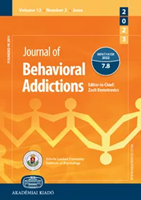The relationship of game genres, in-game purchases, and playing duration with probable gaming disorder in two independent, large-scale online surveys of Japanese adults
The relationship of game genres, in-game purchases, and playing duration with probable gaming disorder in two independent, large-scale online surveys of Japanese adults
Author(s): TAIKI OKA, TAKATOMI KUBO, MISA MURAKAMI, Nao KOBAYASHISubject(s): Media studies, Individual Psychology, Social psychology and group interaction, Neuropsychology, Clinical psychology, Behaviorism, Substance abuse and addiction
Published by: Akadémiai Kiadó
Keywords: gaming disorder; loot box; microtransaction; game genre; objective assessment;
Summary/Abstract: Background and aims: Game genres, availability on smartphones, in-game purchases, and playing duration, have been thought to influence Gaming Disorder (GD). However, little research has comprehensively examined their relationships with GD. Therefore, we examined the relationship between GD, in-game purchases, gaming duration via consoles and smartphones, and genres of smartphone games. Study 1 was based on self-reports, and Study 2 included objective data to clarify these associations. Methods: We conducted two independent online surveys that collected sociodemographic data, game use patterns, and psychopathological assessment data, including GD severity (Study 1: N 5 32,690; Study 2: N 5 3,163). General mental illness scores and objective gaming time were also collected in Study 2. Results: In Study 1, in-game purchases, several gaming genres, and subjective gaming duration were positively associated with probable GD. On the other hand, interactions between card games and loot box charges were negatively related to probable GD. In Study 2, objective gaming times of most game genres were not associated with GD. Although the correlation between subjective and objective gaming duration was moderate, their correlations with GD differed. Discussion and conclusion: These results suggest the complexity of relationships between GD and in-game purchases, genres, and gaming duration. Results of this study suggest the importance of proper assessment of GD reflecting actual functional impairment in social life. Future studies should improve and update evaluation of assessments for gaming
Journal: Journal of Behavioral Addictions
- Issue Year: 13/2024
- Issue No: 1
- Page Range: 205-214
- Page Count: 10
- Language: English

